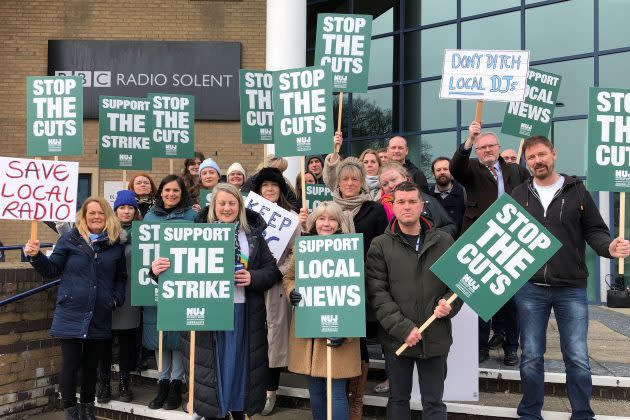BBC Apologizes For Shows Falling Off Air As 1,000 Staff Stage Biggest Strike In 13 Years

UPDATING: The BBC apologized Wednesday for scheduling disruptions as employees stage their biggest strike in 13 years in protest over job losses and changes to local content.
Around 1,000 National Union of Journalists members are expected to down tools for 24 hours beginning at 11 a.m. local time, and the BBC has acknowledged that it will be a difficult day.
More from Deadline
BBC World News Host Laura Trevelyan Quits Weeks After Apologizing For Her Family's Slavery Links
BBC Accused Of Creating "Toxic Culture" In Letter Protesting Closure Of Century-Old Choir
BBC Fails With Late Bid To Halt Staff Strike After Chaotic Walkout Over Gary Lineker's Suspension
Journalists in Leeds formed a picket line and chanted “hands off local BBC” as the strike got underway this morning. Employees wielded placards featuring quotes including “Stop the cuts.”
“Hands off local BBC”🗣 ✊✊
Journalists in Leeds on #NUJBBCStrike to defend local radio. #KeepBBCLocalRadioLocal pic.twitter.com/PecA7xPBCp— NUJ (@NUJofficial) March 15, 2023
The strike forced the BBC to make changes to scheduled programming on local radio. BBC1’s lunchtime regional news bulletin was canceled, while its 6.30PM bulletin is also expected to be derailed. The 6.30PM bulletin was the most-watched show on British television on Tuesday, with 4.3M viewers.
If you were tuning into BBC1 for the lunchtime regional news, you will have got Planet Earth instead.
Strikes will also derail the 6.30pm bulletin and 10.25pm is in doubt.
To put this in some context, BBC1's 6.30pm local bulletin was the most watched show on TV yesterday. pic.twitter.com/9bQ8QZbbcf— Jake Kanter (@Jake_Kanter) March 15, 2023
The strike is expected to disrupt the BBC’s coverage of the government’s Budget, a setpiece moment in the UK political calendar in which ministers are expected to maintain support for energy bills and potentially introduce free childcare.
The BBC said: “We’re sorry that audiences will experience some changes to local TV and radio services in England as a result of industrial action by the National Union of Journalists. We have tried to minimise disruption as much as possible. We are obviously disappointed that the strike has gone ahead.”
In an email to staff Tuesday, Jason Horton, the BBC’s Director of Production for local services, said it would be a “hard moment for everyone” and urged people to treat each other with “kindness and respect.”
The BBC walkout comes on a day of widespread industrial action in the UK, with teachers, doctors, London Underground, and university workers set to go on strike.
BBC employees are protesting against plans to make nearly 50 roles redundant across local services. Radio shows are being cut, while the BBC has axed We Are England, a regional documentary TV show.
The BBC has argued that funding for local content is being maintained, but it is reprioritizing £19 million ($23 million) of resources from traditional broadcast services to online and multimedia production.
Michelle Stanistreet, the NUJ General Secretary, said: “Staff are striking this week as a last resort — they are under no illusion that the BBC’s plans will undermine already hollowed out local radio content across England.”
Some 83% of NUJ members voted in favor of a strike in a postal ballot, with the remaining 17% not supporting a walkout. The turnout was 69%, which was higher than some were expecting.
BBC staff have not staged a major strike since 2010, when there was a 48-hour walkout over a pensions dispute. Flagship shows, including Newsnight and Breakfast, fell off air as star presenters including Fiona Bruce joined the protest.
The International Federation of Journalists, the global union for journalists, voiced its support for the BBC strike.
We stand in solidarity with our @NUJofficial colleagues who are striking today to defend local news and #KeepBBCLocalRadioLocal. Your fight is our fight✊🏽 #NUJBBCStrike pic.twitter.com/m4rPMBkWC7
— IFJ (@IFJGlobal) March 15, 2023
The BBC said: “We have a plan to modernise local services across England – including more news journalists and a stronger local online service – which will see no overall reduction in staffing levels or local funding.
“Our goal is a local service across TV, radio and online that delivers even greater value to communities. We will continue to engage with the trade union and do everything possible to minimise the impact on staff.”
Best of Deadline
Sign up for Deadline's Newsletter. For the latest news, follow us on Facebook, Twitter, and Instagram.

 Yahoo News
Yahoo News 